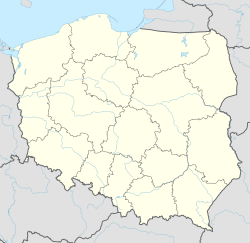User:Szprej~enwiki/brudnopis
Tczew | |
|---|---|
 Tczew Old Town seen from Vistula riverbank | |
| Coordinates: 54°6′N 18°43′E / 54.100°N 18.717°E | |
| Country | |
| Voivodeship | Pomeranian |
| County | Tczew County |
| Gmina | Tczew (urban municipality) |
| Established | 12th century |
| Town rights | 1260 |
| Government | |
| • Mayor | Mirosław Pobłocki |
| Area | |
• Total | 22.26 km2 (8.59 sq mi) |
| Elevation | 25 m (82 ft) |
| Population (2009) | |
• Total | 60,279 |
| • Density | 2,700/km2 (7,000/sq mi) |
| Time zone | UTC+1 (CET) |
| • Summer (DST) | UTC+2 (CEST) |
| Postal code | 83-110 |
| Area code | +48 58 |
| Car plates | GTC |
| Website | http://www.tczew.pl |

Tczew (former German: ⓘ; Kashubian/Pomeranian: Dërszewò) is a town on the Vistula River in Eastern Pomerania, Kociewie, northern Poland with 60,128 inhabitants (1 January 2005). It is an important railway junction with a classification yard dating to the Prussian East Railway. The city is known for its attractive old town and the Vistula Bridge, or Bridge of Tczew, damaged during World War II.
It is the capital of Tczew County in Pomeranian Voivodeship since 1999, and was previously a town in Gdańsk Voivodeship (1975-1998).
History
[edit]Tczew was first mentioned as Trsow in a privilege of the Knights Hospitaller in 1198. By 1252 the settlement was known by the names Tczew and Dirschau, and in 1258 Tczew hosted the first city council in Poland. It received Lübeck rights from Duke Sambor II in 1260. Tczew was captured by Heinrich von Plötzke of the Teutonic Knights in 1308, but was rebuilt from 1364-1384 and granted Chełmno rights. After the Peace of Toruń in 1466, Tczew was transferred from the Teutonic Order to the newly-created Polish province of Royal Prussia.
During the Protestant Reformation most of Tczew's inhabitants converted to Lutheranism. In 1577 the town was burnt to the ground by troops of King Stefan Batory of Poland after they defeated a rebellion by Gdańsk. A 1630 map by Willem Blaeu of the German Empire shows the city name Dirschau, as well as Kirchenbuecher (churchbooks) starting in 1637 of the mostly protestant city. Although Tczew was rebuilt, it then suffered during the Polish-Swedish Wars.
The town was annexed from the Polish-Lithuanian Commonwealth by the Kingdom of Prussia during the Partitions of Poland. It was occupied by Polish troops of General Jan Henryk Dąbrowski in 1807 during the Napoleonic Wars, but became Prussian again in 1815. It became part of the German Empire in 1871.
Tczew grew rapidly during the 19th century after the opening of a railroad line connecting Berlin and Königsberg. The Prussian census of 1905 counted 15,144 Polish or Kashubian-speaking citizens and 25,466 German-speaking citizens in the town.
After World War I Treaty of Versailles, Tczew became part of the Second Polish Republic when troops of General Józef Haller entered the town on January 30 1920. During the Interwar period, Tczew was famous for its maritime academy (later moved to Gdynia).
According to the city's website, Tczew was the location of the start of World War II when German bombers attacked local targets at 04:34 on 1 September 1939 (the shelling of Westerplatte commenced at 04:45). The town was occupied by Nazi Germany during the war and liberated in 1945.
Coat of arms
[edit]The coat of arms of Tczew depicts a red griffin in honor of Duke Sambor II, who granted the town municipal rights in 1260.
Famous residents
[edit]- Johann Reinhold Forster (1729-1798), naturalist
- Alfred Eisenstaedt (1898-1995), photographer
- Grzegorz Kołodko (1949-present), professor of economics
- Marcin Mięciel (1975-present), footballer
- Zbigniew Robert Promiński (1978-present), heavy metal drummer
Population
[edit]1960: 33,700 inhabitants
1970: 41,100 inhabitants
1975: 47,000 inhabitants
1980: 53,600 inhabitants
1990: 59,500 inhabitants
1995: 60,600 inhabitants
2000: 61,200 inhabitants
2001: 61,400 inhabitants
2002: 60,000 inhabitants
2005: 60,128 inhabitants
Sister cities
[edit]Tczew is twinned with:
 Witten, Germany, since 1990
Witten, Germany, since 1990 Kursk, Russia, since 1996
Kursk, Russia, since 1996 Werder (Havel), Germany, since 1998
Werder (Havel), Germany, since 1998 Lev Hasharon, Israel, since 1997
Lev Hasharon, Israel, since 1997 Biržai, Lithuania, since 1997
Biržai, Lithuania, since 1997 London Borough of Barking and Dagenham, United Kingdom, since 1999
London Borough of Barking and Dagenham, United Kingdom, since 1999 Dębno, Poland, since 2000
Dębno, Poland, since 2000 Beauvais, France, since 2005
Beauvais, France, since 2005 Illichivsk, Ukraine, since 2006
Illichivsk, Ukraine, since 2006
External links
[edit]- Municipal webpage (in Polish)
- News and calendar (in Polish)
- News and information from Tczew (in Polish)
- Radio Fabryka - local radio (in Polish)
- Statistics of inhabitants, birth, marriage, death from 1637



